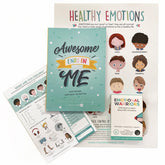A Mindful Approach to Trauma
Disclosure: I have done my utmost to prevent the triggering of difficult thoughts and emotions by labeling anything specific. However, if you believe that this may be a topic that is too overwhelming for you on this day, you will need to make the decision for yourself whether reading this will be conducive to your well-being or not.
Trauma is defined by the American Psychological Association as:
“An emotional response to a terrible event…”
I want to highlight two things here: A An event does not have to be something highly significant for it to be considered traumatic, and B It is not the event itself that causes trauma, it is how it affects us individually.
For some children, the breakup of their parents will be extremely significant and adjustment concerns present themselves in a big way, whereas other children will adjust quite quickly and the long-term effects are minimal. Many factors give rise to these two presentations, namely attachment style, support systems and resiliency.
I want to explore how mindfulness can support individuals through trauma and the myriad of symptoms and concerns that arise because of trauma. Granted everyone experiences trauma in differing ways, so I will discuss this issue in blanket terms.
Generally, proceeding a traumatic event we will witness shock, denial, isolation, anger, memory loss, dissociation, flashbacks, hypervigilance and avoidance. Normal memories are stored in our brain in a uniform fashion however memories of traumatic incidents do not store themselves in this way, rather they store as puzzle pieces, fragmented portions of the event, sights, sounds, smells and feelings. Our brain, feeling under threat effectively goes into survival mode and when this happens memories just don’t have the chance to be processed appropriately. Flashbacks for example are pieces of our puzzle that are protruding through our consciousness but don’t make sense to us because we don’t have the narrative to our story as it is so fragmented. Past and present, facts and feelings all become blurred.
Mindfulness has been empirically proven effective in supporting those who have experienced trauma because it:
- Helps with accepting what has happened. This doesn’t mean forgiveness or being ok with what has taken place. But accepting is such a powerful tool which allows us to start moving on with our lives.
- Mindfulness, meditation and yoga have a significant effect on our well-being by reducing stress levels and reducing traumas effect on our nervous system.
- It supports us to reconnect our body with our mind so that real healing can take place. This connection is often severed after trauma as our brain tries to dissociate from the overwhelming physical sensations and feelings of our body. Physical movement allows our bodies to digest the trauma and we then have more of an idea of how we can look after ourselves to feel whole again.
- It allows us to put words and feelings to how we have been impacted so we can start to express ourselves appropriately.
- Mindfulness helps us to process our memories and re-create our trauma story.
- When trauma is encountered, the brain changes in response to the event to cope and adapt to the situation. Mindfulness and meditation helps to reverse this deregulation.
- It helps re-train our brain to get out of the vicious cycle of negative self-talk we engage in after a traumatic event. It trains us in how to “unstick” ourselves.
Here is my “Mindful Toolkit For Trauma”
PARTICIPATE IN MINDFUL MOVEMENT
Activities such as yoga , walking, tai chi or any exercise that employs cross coordination. This assists with the mind-body connection I spoke about earlier. In yoga specifically try forward bends, back bends and twisting postures. Forward bends and back bends are recommended for anxiety-twisted postures are not. These postures can set you up for a restful meditation as well.
DEVELOP A REGULAR MEDITATION PRACTICE
This allows your mind the time to rest and learn to be ok with ‘being’ rather than ‘doing’. Doing is great sometimes, but can have an adverse effect as it keeps us from confronting how we are feeling by always being busy. When we avoid our thoughts and our feelings we can never truly heal. Practice with small guided meditations that are centered around soothing or serene sounds that you are comfortable with.
START A GRATITUDE PRACTICE
Start re-training your brain to direct its attention towards helpful stimuli. This not only improves our mood and mindset but it allows for healthy pathways to be established in our brain. Once our brain is alerted to areas that are going well it starts the process of actively seeking out more of these things.
Gratitude Journals by AwesoME Inc HERE >
BRING A MINDFUL AWARENESS TO THE PRESENT MOMENT
When our attention is on the present it helps us work with our emotions and feelings more appropriately and it supports us with making the distinction between “this happened in the past, it is not happening right now”, “I am safe in the here and now”, “I can control my current experience”.
To note: If this is an area you are passionate about or if you would like to share your story feel free to get in touch. If this has brought up any discomfort for you ensure that you discuss this with someone that you trust. Mindfulness is a helpful adjunct to other therapies and the role of a support worker, psychologist or counsellor is often pivotal in guiding someone through this journey.
Further, because we are challenged to bear witness to what has been stored inside our minds, bodies and hearts this can be particularly confronting, so going slow and reaching out is key.
Metta,
Victoria
About Victoria Hood
Victoria has been working in the mental health and addiction field over the past 7 years since leaving University with an honours degree in Psychology. During her time spent working in addiction, Victoria was introduced to the practice of mindfulness. Since this time Victoria has become extremely passionate about incorporating mindfulness into both her professional and her family life.
Victoria has an honours degree in Psychology from the University of Canterbury. She is a Life Coach, Mindfulness Coach, Mindfulness Practitioner in schools and is a passionate holistic health and well-being advocate and facilitator of mindfulness based workshops.














